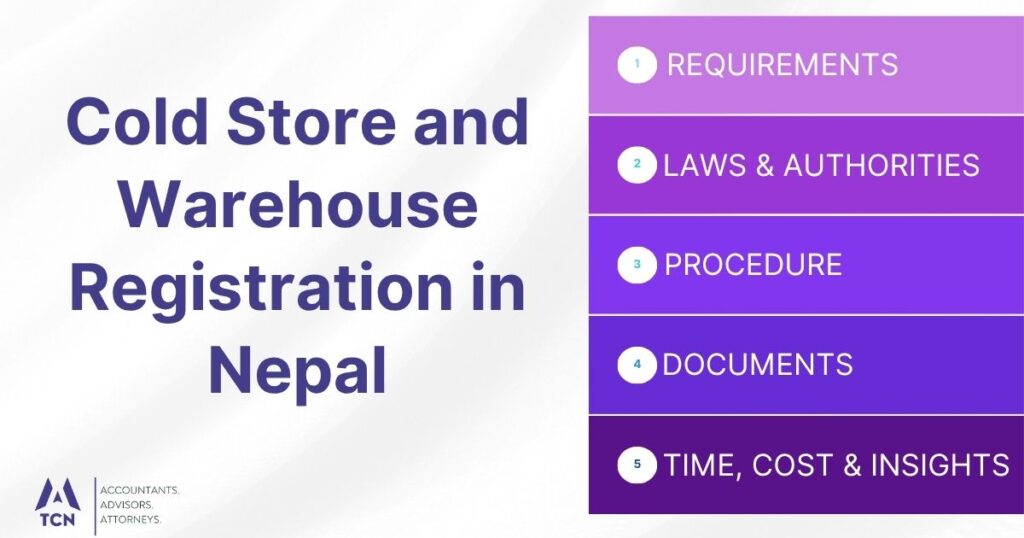Introduction and Overview of Cold Storage and Warehouse Business in Nepal
Cold storage and warehouse facilities play a crucial role in Nepal’s agricultural economy and supply chain management. These facilities preserve perishable goods, reduce post-harvest losses, and ensure food security throughout the country. The Government of Nepal recognizes the importance of cold storage infrastructure and has established specific regulations under the Company Act 2063 (2006) and Industrial Enterprises Act 2076 (2020) to govern their registration and operation.
Nepal’s agricultural sector contributes approximately 27% to the national GDP, making cold storage facilities essential for maintaining the quality of agricultural products. The National Agriculture Policy 2061 emphasizes the development of post-harvest infrastructure, including cold storage facilities, to reduce agricultural losses and improve farmer income.
Foreign investors can establish cold storage and warehouse facilities in Nepal through Foreign Direct Investment (FDI) under the Foreign Investment and Technology Transfer Act 2075 (2019). The manufacturing investment Nepal sector welcomes international partnerships to modernize storage infrastructure and introduce advanced preservation technologies.
Types of Cold Storage Facilities Regulated in Nepal
Cold storage facilities in Nepal are categorized based on their capacity and purpose:
- Agricultural Cold Storage: Designed for fruits, vegetables, and dairy products
- Pharmaceutical Cold Storage: Specialized for medicines and vaccines
- Industrial Cold Storage: For processed foods and beverages
- Multi-purpose Warehouses: Combined storage for various commodities
The Department of Industry oversees the registration process for these facilities, ensuring compliance with Nepal investment laws and international quality standards.
Legal Requirements for Cold Storage and Warehouse Registration
Regulatory Framework and Compliance Standards
The establishment of cold storage and warehouse facilities in Nepal must comply with multiple regulatory frameworks. The Industrial Enterprises Act 2076 serves as the primary legislation governing industrial establishments, including storage facilities. Additionally, the Environment Protection Act 2076 requires environmental impact assessments for large-scale storage facilities.
Under the Food Act 2066, cold storage facilities handling food products must obtain food safety certifications from the Department of Food Technology and Quality Control. The Labor Act 2074 mandates compliance with worker safety standards and employment regulations for warehouse operations.
Minimum Capital Requirements
The minimum capital requirements for cold storage and warehouse registration vary based on facility size and type:
- Small-scale facilities (up to 100 MT capacity): NPR 5 million minimum investment
- Medium-scale facilities (100-500 MT capacity): NPR 20 million minimum investment
- Large-scale facilities (above 500 MT capacity): NPR 50 million minimum investment
Foreign investors must meet additional requirements under FDI in Nepal regulations, including minimum foreign equity participation of 51% for technology transfer projects.
Location and Infrastructure Standards
Cold storage facilities must comply with specific location and infrastructure requirements:
Zoning and Land Use Compliance
- Facilities must be located in designated industrial zones or agricultural processing areas
- Land ownership documents must be clear and registered under Land Revenue Act 2034
- Environmental clearance required for facilities exceeding 1000 MT capacity
- Compliance with local municipality building codes and fire safety regulations
Technical Specifications
- Temperature control systems meeting international standards (-18°C to +4°C range)
- Backup power supply systems with minimum 72-hour capacity
- Proper insulation and refrigeration equipment certification
- Waste management systems complying with Solid Waste Management Act 2068
Detailed Registration Process for Cold Storage and Warehouse Facilities
Step 1: Preliminary Assessment and Site Selection
The registration process begins with a comprehensive preliminary assessment of the proposed cold storage facility. Investors must conduct a feasibility study examining market demand, location advantages, and technical requirements. The Department of Industry provides preliminary consultation services to assess project viability under manufacturing investment Nepal guidelines.
Site selection requires careful consideration of proximity to agricultural production areas, transportation networks, and power supply infrastructure. The proposed location must comply with local zoning regulations and environmental protection standards. Investors should obtain a location clearance certificate from the respective municipality or rural municipality before proceeding with formal registration.
The preliminary assessment phase also involves engaging with local communities and stakeholders to ensure social acceptance of the project. This step is particularly important for large-scale facilities that may impact local employment and economic activities.
Step 2: Company Registration and Legal Entity Formation
Foreign and domestic investors must establish a legal entity before applying for cold storage registration. Under the Company Act 2063, investors can choose from several business structures including private limited companies, public limited companies, or partnerships. Most cold storage facilities operate as private limited companies due to operational flexibility and limited liability protection.
The company registration process involves submitting incorporation documents to the Office of Company Registrar. Required documents include memorandum and articles of association, board resolution for company formation, and proof of minimum paid-up capital. The registration fee varies from NPR 1,000 to NPR 25,000 depending on company capital.
For foreign investors, additional compliance with Foreign Investment and Technology Transfer Act 2075 is mandatory. This includes obtaining foreign investment approval from the Department of Industry and meeting minimum foreign equity requirements.
Step 3: Industrial License Application and Approval
The industrial license application represents the core registration requirement for cold storage facilities. Applicants must submit detailed project proposals to the Department of Industry including technical specifications, financial projections, and environmental impact assessments. The application must demonstrate compliance with Nepal investment laws and industrial policy objectives.
The Industrial Enterprises Act 2076 requires submission of feasibility studies prepared by certified consultants. These studies must address market analysis, technical feasibility, financial viability, and environmental impact. Large-scale facilities exceeding NPR 100 million investment require additional scrutiny and approval from the Investment Board Nepal.
Processing of industrial license applications typically involves site inspections by department officials to verify proposed infrastructure and compliance with safety standards. The department may request additional documentation or modifications to ensure regulatory compliance.
Step 4: Environmental and Safety Clearances
Environmental clearance is mandatory for cold storage facilities under the Environment Protection Act 2076. Facilities with capacity exceeding 1000 MT or investment above NPR 50 million require comprehensive Environmental Impact Assessments (EIA). Smaller facilities may qualify for Initial Environmental Examination (IEE) procedures.
The Ministry of Forests and Environment oversees the environmental clearance process through designated regional offices. Applicants must submit environmental management plans addressing waste disposal, energy consumption, and potential environmental impacts. The clearance process includes public consultation requirements for large-scale projects.
Safety clearances involve multiple agencies including fire department approval, electrical safety certification, and occupational health compliance. The Department of Labor and Occupational Safety conducts workplace safety assessments to ensure compliance with Labor Act 2074 provisions.
Step 5: Final Registration and Operational Permits
The final registration phase involves obtaining operational permits from relevant regulatory authorities. Cold storage facilities handling food products must obtain licenses from the Department of Food Technology and Quality Control under Food Act 2066 provisions. This includes facility inspections, staff training certifications, and quality control system verification.
Tax registration with the Inland Revenue Department is mandatory for all commercial operations. Cold storage facilities must register for Value Added Tax (VAT) and income tax obligations. The Industrial Enterprises Act 2076 provides various tax incentives for storage infrastructure investments, including accelerated depreciation and tax holidays.
Municipal permits for business operation, signage, and waste management complete the registration requirements. Local municipalities issue trade licenses and monitor ongoing compliance with local regulations and building codes.
Required Documents for Cold Storage and Warehouse Registration
Primary Documentation Requirements
The documentation requirements for cold storage and warehouse registration are comprehensive and must be submitted in prescribed formats. All documents must be authenticated and translated into Nepali language where applicable.
Company Formation Documents
- Certificate of Company Registration from Office of Company Registrar
- Memorandum and Articles of Association with cold storage business objectives
- Board Resolution authorizing cold storage facility establishment
- Share Allocation and Ownership Structure documentation
- Tax Registration Certificates (PAN, VAT) from Inland Revenue Department
Technical and Infrastructure Documents
- Detailed Project Report prepared by certified technical consultants
- Architectural Drawings and Engineering Plans approved by licensed engineers
- Equipment Specifications and Procurement Plans with technical certifications
- Power Load Assessment and Electrical Safety Certificates
- Fire Safety and Emergency Response Plans approved by fire department
Regulatory Compliance Documents
Environmental and Safety Documentation
- Environmental Impact Assessment or Initial Environmental Examination report
- Environmental Management Plan with waste disposal and pollution control measures
- Occupational Health and Safety Assessment complying with Labor Act provisions
- Emergency Response and Disaster Management Plans
- Insurance Coverage Documentation for facility and equipment protection
Land and Location Documents
- Land Ownership Certificate or lease agreement with clear title
- Location Map and Site Plan with GPS coordinates
- Zoning Compliance Certificate from local municipality
- Utility Connection Agreements for electricity, water, and telecommunications
- Transportation Access and Road Connectivity Assessment
Time Frame and Cost Structure for Registration
Registration Timeline and Processing Periods
The complete registration process for cold storage and warehouse facilities typically requires 90 to 180 days, depending on project complexity and regulatory requirements. The timeline varies significantly based on facility size, foreign investment involvement, and environmental clearance requirements.
Phase-wise Timeline Breakdown
Initial Phase (30-45 days): Company registration, preliminary approvals, and document preparation consume the initial phase. Simple domestic investments may complete this phase faster, while FDI in Nepal projects require additional time for foreign investment approvals.
Regulatory Approval Phase (45-90 days): Industrial license processing, environmental clearances, and technical approvals constitute the longest phase. Large-scale facilities requiring EIA may extend this phase to 120 days due to public consultation requirements.
Final Clearance Phase (15-30 days): Operational permits, municipal licenses, and final inspections complete the registration process. Facilities with complex technical requirements may require additional time for compliance verification.
Cost Structure and Fee Schedule
Government Fees and Charges
Registration costs vary significantly based on facility size, investment amount, and regulatory requirements. The following fee structure applies to different categories:
- Company Registration Fee: NPR 1,000 to NPR 25,000 based on authorized capital
- Industrial License Fee: NPR 5,000 to NPR 50,000 depending on investment size
- Environmental Clearance Fee: NPR 10,000 to NPR 100,000 for EIA/IEE processing
- Municipal Permits and Licenses: NPR 5,000 to NPR 20,000 for various local permits
- Technical Inspection Fees: NPR 2,000 to NPR 10,000 for safety and quality assessments
Professional Service Costs
- Legal and Consulting Services: NPR 100,000 to NPR 500,000 for complete registration support
- Technical Documentation: NPR 50,000 to NPR 200,000 for engineering and feasibility studies
- Environmental Assessment: NPR 100,000 to NPR 1,000,000 for EIA/IEE preparation
Post-Registration Obligations and Compliance Requirements
Ongoing Regulatory Compliance
Cold storage and warehouse facilities must maintain continuous compliance with multiple regulatory frameworks after registration. The Industrial Enterprises Act 2076 mandates annual reporting to the Department of Industry, including production statistics, employment data, and financial performance indicators.
Annual Reporting Requirements
- Industrial Statistics Report: Annual submission of operational data and performance metrics
- Environmental Compliance Report: Quarterly monitoring of environmental parameters and waste management
- Labor Compliance Documentation: Regular reporting of employment practices and worker safety measures
- Tax Filing and Financial Reporting: Compliance with income tax and VAT obligations
- Quality Control Certifications: Annual renewal of food safety and quality management certifications
Renewal and Maintenance Obligations
License Renewal Procedures
Industrial licenses require periodic renewal based on facility type and investment size. Small-scale facilities renew licenses every five years, while large-scale operations may require annual renewals for certain permits. The renewal process involves facility inspections, compliance verification, and updated documentation submission.
Environmental clearances require renewal every five years with updated environmental impact assessments. Facilities must demonstrate continued compliance with environmental standards and implementation of approved mitigation measures.
Operational Compliance Monitoring
- Regular Inspections: Government agencies conduct periodic inspections to verify ongoing compliance
- Quality Assurance Systems: Implementation of quality management systems meeting international standards
- Worker Safety Programs: Continuous training and safety protocol implementation
- Equipment Maintenance: Regular calibration and maintenance of refrigeration and monitoring systems
- Record Keeping: Maintenance of detailed operational records for regulatory review


